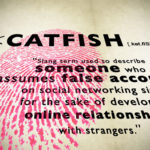‘Sextortion’ is a Crime in New South Wales

Over the past decade or so, social media has become a popular way for people to connect and get to know each other.
But sadly, it has also become the preferred mechanism for nasty and unscrupulous people to ‘catfish’ others, as well as to commit hurtful and potentially devastating crimes such as ‘revenge porn’ and ‘sextortion’.
Image-based abuse is on the rise
As the name suggests, sextortion is a form of extortion that involves matters of a sexual nature – usually images and recordings.
It occurs most commonly when one person requests naked photos or film from another and the target obliges, after which the perpetrator demands money, gift cards or other material benefits under threat the material will otherwise be published and/or send to family and friends.
Sextortion is a form of image-based abuse, and it can be prosecuted in Australia under a number of different cyber crimes, although it is not (yet) a specific crime, with a specific law.
Often, dating websites are better prepared and equipped to deal with these potential scenarios, because ‘dating’ and ‘matchmaking’ are their core business.
But when you meet someone on Facebook or Instagram, for example, you don’t always get a swift response, or intervention. Many social media platforms have received criticism for this – Tinder has been forced to make numerous changes in recent years to make its platform safer for all users.
Australia’s eSafety Laws
However, in 2022, the Federal Online Safety Act 2021 (Cth), was introduced, which contains laws which compel platforms such as Twitter, Facebook, and Instagram to remove “cyber abuse material” within 24 hours. Failure to do so can face fines as well as injunctions that can suspend or even stop them from operating.
Also under the laws, Section 75 makes it an offence for a person to post, or threaten to post, and intimate image of another person without the latter’s consent. However these intimate image laws only relate to Australians posting images of other Australians living in the country.
Young men are the most at risk
A recent story circulating in the media highlighted the experience of a man in his twenties who befriended a young woman online. After a period of messaging, the woman asked for nude photos. He supplied them.
Shortly afterwards he found himself talking to a man with a foreign accent demanding $5,000 or he would release the photos.
Sometimes, the financial demands increase in value over time, or become more frequent. The concerning thing about this particular attempt at sextortion is that it was meticulously planned, and carried out over a period of time.
Now imagine that you’re 13 years old, with an Instagram account for the first time. You connect with friends of friends, not always knowing exactly who they are, but acting on blind trust of a young person that if they’re in the wider ‘social circle’ everything will be ok.
Unfortunately teens are often the most vulnerable to this type of abuse. These set ups or scams are becoming more and more sophisticated – not always easy to identify, until it’s too late. And cyber crime experts say increasingly the perpetrators are offshore criminal syndicates who have the time and the resources to invest in making their scams incredibly realistic.
Teens aren’t the only ones susceptible to these crimes. According to cyber crime experts, crimes such as sextortion rose substantially during the Covid-19 pandemic, when people were in lockdown and had limited opportunities for socialising or meeting new people except online.
Eleven per cent of Australian adults have been targets of this type of abuse. However, according to the Australian Federal Police-led Australian Centre to Counter Child Exploitation (ACCCE), there was a 60 per cent increase in reported cases of sextortion last December alone. Young males make up 90 percent of victims.
What to do if you’re a victim
While taking precautions is obviously the best advice, if you are a target of image-based abuse such as sextortion, then the best thing to do, despite the fact that it feels counterintuitive, is not to delete any communication, or any images, and, obviously don’t pay up.
By not paying the money you do run the risk of the image being released (as Medibank found out when it refused to pay ransom for data), so it’s imperative to contact the police or or Australia’s eSafety Commission. You will be advised on the correct steps to take for your particular situation.
The eSafety Commissioner has broad powers to gather information with a view to identifying and potentially prosecuting offending individuals and to require internet companies who operate in Australia to remove such content.
It’s important to note that if you still keep contact with the perpetrator ‘open’, then it can be easier for the cyber experts to track and trace, and gather evidence.
Image-based abuse can of course, be extremely stressful for the victim. And that’s not something to take lightly – people have committed suicide not knowing how to deal with it.
Online Image-based abuse offences in New South Wales
It is a crime that is taken very seriously in Australia and while sextortion is not a stand-alone criminal offence, it can be prosecuted under a number of laws relating to ‘revenge porn’ and ‘using a carriage service to harass or menace another person.’
In 2017, New South Wales passed the Crimes Amendment (Intimate Images) Bill. Under
sections 91P, 91Q and 91R of the Crimes Act 1900, it an offence to intentionally record an intimate image of another person without that other person’s consent, while knowing or being reckless to the fact that the other person did not consent.
It is also an offence (Section 91Q) to intentionally distribute an intimate image of another person without that other person’s consent, while knowing or being reckless to the fact that the other person did not consent. It is punishable by up to 3 years’ imprisonment and/or a fine of $11,000.
And section 91R makes it a crime for anyone to threaten to record or distribute an intimate image without consent, intending the other person to fear the threat would be carried out.
Each of these crimes is punishable by up to 3 years’ imprisonment and/or a fine of $11,000.
An ‘intimate image’ is defined under the law as:
- ‘an image of a person’s private parts, or of a person engaged in a private act, in circumstances in which a reasonable person would reasonably expect to be afforded privacy, or
- an image that has been altered to appear to show a person’s private parts, or a person engaged in a private act, in circumstances in which a reasonable person would reasonably expect to be afforded privacy.







